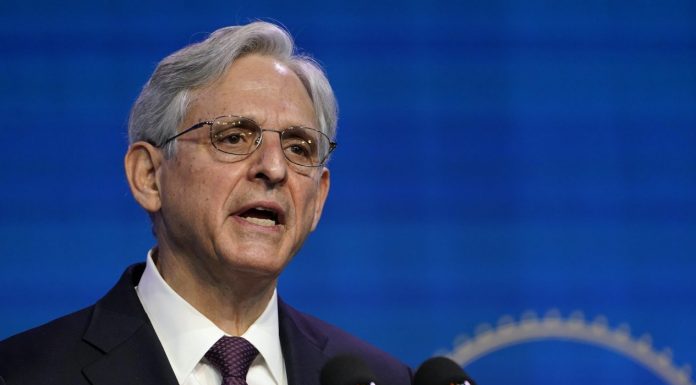(Headline USA) The Justice Department is halting federal executions after a historic use of capital punishment by the Trump administration, which carried out 13 executions in six months.
Attorney General Merrick Garland made the announcement Thursday night, saying he was imposing a moratorium on federal executions while the Justice Department conducts a review of its policies and procedures. He gave no timetable.
“The Department of Justice must ensure that everyone in the federal criminal justice system is not only afforded the rights guaranteed by the Constitution and laws of the United States, but is also treated fairly and humanely,” Garland said, trying to imply that the prior administration had not. “That obligation has special force in capital cases.”
Garland said the department would review the protocols put in place by former Attorney General William Barr. A federal lawsuit has been filed over the protocols — including the risk of pain and suffering associated with the use of pentobarbital, the drug used for lethal injection.
The decision puts executions on hold for now, but it doesn’t end their use and keeps the door open for another administration to simply restart them. It also doesn’t stop federal prosecutors from seeking the death penalty; the Biden administration recently asked the U.S. Supreme Court to reinstate the Boston Marathon bomber’s original death sentence.
President Joe Biden has said he opposes the death penalty and his team vowed that he would take action to stop its use while in office. But the issue is uncomfortable one for Biden. As a then-proponent of the death penalty, Biden helped craft 1994 laws that added 60 federal crimes for which someone could be put to death, including several that did not cause death. He later conceded the laws disproportionately impacted black people.
Anti-death penalty advocates had hoped for a more definitive answer from the Biden administration. Support for the death penalty among Americans is at near-historic lows after peaking in the mid-1990s and steadily declining since, with most recent polls indicating support now hovers around 55%, according to the nonpartisan Death Penalty Information Center in Washington, D.C.
Ruth Friedman, Director of the Federal Capital Habeas Project, which represented some of the prisoners on death row, said Garland’s action was a step in the right direction, but it’s not enough. She called on Biden to commute the sentences.
“We know the federal death penalty system is marred by racial bias, arbitrariness, over-reaching, and grievous mistakes by defense lawyers and prosecutors that make it broken beyond repair,” she said.
There are 46 people still on federal death row.
White House spokesman Andrew Bates said Biden was “pleased the Attorney General is taking these steps” and emphasized that the president has “significant concerns about the death penalty and how it is implemented.”
The review is strikingly similar to one to one imposed during the Obama administration. In 2014, following a botched state execution in Oklahoma, President Barack Obama directed the Justice Department to conduct a broad review of capital punishment and issues surrounding lethal injection drugs.
Barr announced the restarting of executions in 2019, saying the Obama-era review had been completed and clearing the way for executions to resume. He approved the new procedure for lethal injections that replaced the three-drug combination previously used in federal executions with one drug, pentobarbital. This is similar to the procedure used in several states, including Georgia, Missouri and Texas, but not all.
The Justice Department resumed federal executions in July, following a 17-year hiatus. No president in more than 120 years had overseen as many federal executions. The last inmate to be executed, Dustin Higgs, was put to death at the federal prison complex in Terre Haute, Indiana, less than a week before Trump left office.
Adapted from reporting by Associated Press.

